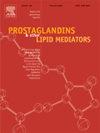Associations between omega-3 fatty acid-derived lipid mediators and markers of inflammation in older subjects with low-grade chronic inflammation
IF 2.5
3区 生物学
Q3 BIOCHEMISTRY & MOLECULAR BIOLOGY
Prostaglandins & other lipid mediators
Pub Date : 2025-01-01
DOI:10.1016/j.prostaglandins.2025.106948
引用次数: 0
Abstract
Cardiovascular disease (CVD), the leading cause of death in the United States and globally, is a chronic inflammatory disease likely caused by an impaired ability to resolve inflammation. Pre-clinical studies have provided strong evidence of the activating role of specialized pro-resolving lipid mediators (SPMs) derived from the omega-3 fatty acids eicosapentaenoic acid (EPA), docosapentaenoic acid (DPA) and docosahexaenoic acid (DHA) on the resolution of inflammation. However, there is a dearth of information on the role of SPMs on inflammation in humans. Therefore, the aim of this study was to assess whether plasma concentrations of omega-3 fatty acids and their derived SPMs are associated with inflammatory markers in subjects with low-grade chronic inflammation (C-reactive protein >2 µg/mL). The plasma phospholipid content of omega-3 fatty acids, a marker of dietary intake, plasma concentrations of SPMs, and serum concentrations of inflammatory markers were measured in 21 older men and postmenopausal women (age 53–73 y) at the end of a four-week placebo phase (3 g/day high oleic acid sunflower oil). The phospholipid DHA content was inversely related to interleukin-6 (IL-6), tumor necrosis factor-α (TNF-α), monocyte chemoattractant protein-1 (MCP-1) and IL-10 concentrations. Moreover, MCP-1 was inversely associated with the DHA-derived 14-HDHA and 4-HDHA, and IL-10 was inversely associated with EPA-derived 18-HEPE, 12-HEPE and 5-HEPE, DPA-derived Rv5DPA, and DHA-derived 4-HDHA. These findings support the anti-inflammatory effect of dietary omega-3 fatty and suggest that lipid mediators derived from EPA, DPA, and DHA participate in the regulation of inflammation in subjects with chronic inflammation.
omega-3脂肪酸衍生的脂质介质与老年低度慢性炎症受试者炎症标志物之间的关系
心血管疾病(CVD)是美国和全球的主要死亡原因,是一种慢性炎症性疾病,可能是由炎症消退能力受损引起的。临床前研究已经提供了强有力的证据,证明了从ω -3脂肪酸二十碳五烯酸(EPA)、二十二碳五烯酸(DPA)和二十二碳六烯酸(DHA)中提取的专门的促溶解脂质介质(SPMs)在解决炎症方面的激活作用。然而,关于SPMs在人类炎症中的作用的信息缺乏。因此,本研究的目的是评估低级别慢性炎症受试者的血浆omega-3脂肪酸浓度及其衍生SPMs是否与炎症标志物(c反应蛋白>2µg/mL)相关。在为期四周的安慰剂期(3克/天高油酸葵花籽油)结束时,测量了21名老年男性和绝经后女性(53-73岁)的血浆磷脂含量-3脂肪酸,饮食摄入量的标志,血浆SPMs浓度和血清炎症标志物浓度。磷脂DHA含量与白细胞介素-6 (IL-6)、肿瘤坏死因子-α (TNF-α)、单核细胞趋化蛋白-1 (MCP-1)和IL-10浓度呈负相关。此外,MCP-1与dha衍生的14-HDHA和4-HDHA呈负相关,IL-10与epa衍生的18-HEPE、12-HEPE和5-HEPE、dpa衍生的Rv5DPA和dha衍生的4-HDHA呈负相关。这些发现支持了膳食中omega-3脂肪的抗炎作用,并表明来自EPA、DPA和DHA的脂质介质参与了慢性炎症受试者的炎症调节。
本文章由计算机程序翻译,如有差异,请以英文原文为准。
求助全文
约1分钟内获得全文
求助全文
来源期刊

Prostaglandins & other lipid mediators
生物-生化与分子生物学
CiteScore
5.80
自引率
3.40%
发文量
49
审稿时长
2 months
期刊介绍:
Prostaglandins & Other Lipid Mediators is the original and foremost journal dealing with prostaglandins and related lipid mediator substances. It includes basic and clinical studies related to the pharmacology, physiology, pathology and biochemistry of lipid mediators.
Prostaglandins & Other Lipid Mediators invites reports of original research, mini-reviews, reviews, and methods articles in the basic and clinical aspects of all areas of lipid mediator research: cell biology, developmental biology, genetics, molecular biology, chemistry, biochemistry, physiology, pharmacology, endocrinology, biology, the medical sciences, and epidemiology.
Prostaglandins & Other Lipid Mediators also accepts proposals for special issue topics. The Editors will make every effort to advise authors of the decision on the submitted manuscript within 3-4 weeks of receipt.
 求助内容:
求助内容: 应助结果提醒方式:
应助结果提醒方式:


